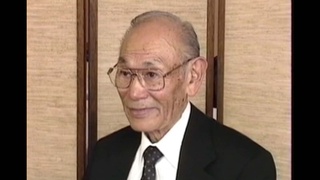Interviews
Difference between experiences of youth and older people in WWII camps
There’s a big separation of people in camp. The under high school, I would say, I had good memories, yes. And you see that in the reunions. So the reunions of the camp of 1945 graduates are the biggest of all the camps. You see that even today. So it means that all of those people remember and want to get together. All the ’46 graduates, little bit less. That’s my age. And ’47 graduates almost have no reunions—that’s like my younger brother—because maybe they were too young. But still I think it’s true that the children had a lot of people to play with. And I was constantly playing.
So over high school, this is where it cuts, where people have, I’m sure, suffered and have been disadvantaged by the camp. Their careers were interrupted, studies interrupted. And so either they had to get out of camp and try to go to school somewhere. Or if they stayed in camp, I’m sure it was not good for them. And then the older people like my parents, who had a business, they had to suffer a lot because they lost the business. They were living in these very small rooms and deprived of everything that they really had. So they don’t have their own kitchen, their own bathroom they don’t have. So I’m sure they suffered. And as I say, being the younger child, I wasn’t aware of that too much.
Date: February 10, 2004
Location: California, US
Interviewer: Gwenn M. Jensen
Contributed by: Watase Media Arts Center, Japanese American National Museum.
Explore More Videos

The Perspective of Youth
(1923–2006) Community activist. Co-founded the Manzanar Committee

Choice to move east or go to Japan
(b.1920) Japanese Canadian Nisei. Established the Ikenobo Ikebana Society of Toronto


Institutionalization as a bad aspect of camp
(1924-2018) Researcher, Activist

State Department records show concern for treatment of Japanese American internees
(1924-2018) Researcher, Activist

Remembering December 7, 1941
(1923-2011) Lawyer, MIS veteran, founder of Francis and Sarah Sogi Foundation

Meeting Japanese Americans from the mainland in MIS
(1923-2011) Lawyer, MIS veteran, founder of Francis and Sarah Sogi Foundation

Awareness of concentration camps as a Japanese American
(1923-2011) Lawyer, MIS veteran, founder of Francis and Sarah Sogi Foundation

Manhunt
(1919 - 2005) Challenged the constitutionality of Executive Order 9066.

The Final Verdict
(1919 - 2005) Challenged the constitutionality of Executive Order 9066.


Reaction to a 1942 speech by Mike Masaoka, Japanese American Citizen League's National Secretary
(1915 - 2011) Nisei florist who resettled in New York City after WW II. Active in Japanese American civil rights movement


Reasons for conformity and competitiveness in Gardena, California
(b. 1946) Lawyer

Role of the redress movement in helping Nisei to open up about their wartime experiences
(b. 1946) Lawyer
